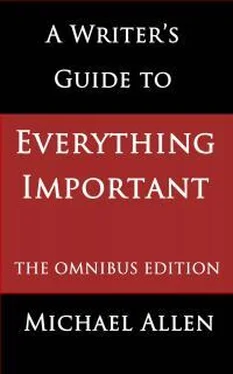I sometimes wonder how my life would have gone if I’d never met Con McDonald. Would it have been better, or worse?
One thing is sure: if I hadn’t met Con I would never have got around to asking Debbie to go out with me. For a start I thought she was too good for me. And she’s so beautiful that I was sure she would be living with someone else. So I suppose I owe Con a favour for that.
Con kind of introduced himself to me one horrible night in November, the year before last. The twenty-second it was. Twenty-second of November 2010. I’m not likely to forget it.
He’s a very determined man, is Con. Persistent, clever, and good with people. Well, he’s had a lot of practice. That particular night Con had one thing on his mind. And when Con sets his mind to something it usually gets done. As for me, all I wanted to do that night was get home, go to bed, and pull the blankets over my head.
I’d gone over to Bristol to see a specialist. It’s a fair old way to Bristol. When I came out of the clinic, I found it was raining, so I pulled a woolly cap down over my ears. And then I set off for the van.
I suppose I heard the clinic door bang for a second time as I was walking along, but I didn’t pay much attention to it. The doctor had given me a lot to think about.
And then this bloke appeared beside me. Short, and a bit tubby. Not much hair. He was wearing jeans and a leather jacket.
‘Fancy a drink, Harry?’ he said. ‘I could do with one myself. I’ve been in the clinic too, like you.’
It never occurred to me to ask how he knew my name. As I said, I was a bit worried at the time, so I just assumed that he’d heard a nurse mention my name or something. Or perhaps we’d played darts and he remembered me from that.
Anyway, I certainly didn’t want a drink. ‘No thanks,’ I said. And kept walking.
Con, of course, didn’t give up. He never does. He just trotted along, keeping up with me, and went on prattling away. Can’t remember now what he said. But eventually he said, ‘Hard to take it all in really, isn’t it Harry?’
So I stopped and looked at him. ‘What do you mean?’
‘Well,’ he said, ‘I was in the clinic too, you know. Been there lots of times. And when you’ve had bad news it’s a good idea to stop and have a drink. Let your mind settle for a bit – especially before you drive. That’s what I always think.’
And before I knew where I was he’d wheeled me into a pub.
14.5 Decent White Folk
My final example of stylistic variation in first-person narrative fiction is taken from a short story of mine with the title Decent White Folk.
For the benefit of readers who were not born and brought up in the UK, perhaps I had better say that this story is written in a north-country dialect, phonetically spelt. Just try reading what’s there, and you should be able to follow it. I may also need to explain that, in the past few decades, many of the great cities of the north of England have seen a huge influx of immigrants, many of them from Pakistan. Not all the original white inhabitants of these cities have been delighted by this development.
The story is related by an unnamed member of the CID department in the local police force.
Because of the peculiarities of rendering the strong dialect into print, the fog index cannot be regarded as having great validity, but for the record it is 6.56 – call it 7. Not bad, considering.
It would ave been all right if New Millennium Ripper ad stuck to killing Pakis. But e didn’t, see. E started killing decent white folk, and then we ad to do summat. Me and Inspector, like.
First two or three times we found victims – well, four actually – me and Inspector just stood there, like, and ad a bit of a laff.
‘Ee lad,’ said Inspector, when we found fust un. ‘If I didn’t know better, I’d say this one’s ad is throat cut.’
I looked at victim. Is eyes was wide open, and is throat was too, where someone ad slashed im with a carver. Or a razor, or summat. Course, e was black as the coal-ouse floor. Well, nearly black, any road. Like they are, them Asians.
‘My word,’ I says. ‘That’s a nasty accident is that, Inspector. What do you reckon it wa?’
‘Oo, I dunno,’ e says. ‘It and run, praps. You get some sharp edges ont front of cars these days. Another five mile an our and e’d ave took is ead off.’
So that’s what we put it down as, see. It and run. And carted Paki off tut mortuary, quick as you like.
And that’s what we did with next three, too. First wuz it and run. Then we ad, fell though plate-glass winder while drunk, and beheaded isself. Third woz – lemme see – industrial accident. Cos e was left round back of a factry was that one. And last one wuz trespassin on railway property. Cos we found him quite close tut railway and shifted im a few feet sideways so’s next train would finish off what New Millennium Ripper ad started.
That’s wot us detectives called im, see, the bloke what done these things. New Millennium Ripper. Course, they were all men, these victims, and original Rippers went in for lasses, as we all know, but we could see fromt start that this series of crimes were allt work of one bloke. Sort of trademark technique it wa. Right-anded slash from beyind – probly with a butcher’s knife. Bloody sharp, any road. Fookin took their eads off e did.
Like I say, fust four was Pakis. But then we ad Mr Wilberforce. Im as kept corner shop for about forty year. Corner of Shit-hole Alley (as we used to call it) and Parson’s-Nose Lane. Which is just Parson’s Lane ont maps o course. Me and Inspector found Mr Wilberforce int alley, after is missis rang in and said e adn’t come back from walkint dog.
‘By eck, lad,’ said Inspector. ‘It’s fookin dark out ere but I don’t think Ripper ud mistake Mr Wilberforce for a Paki. Do you?’
I ad to admit I didn’t think so neither.
‘So what the fookin ell is e doin then?’ Inspector asked me. ‘Things ave come to a pretty fookin pass if a bloke can’t tek is dog for a walk without some fooker tryin to cut is ead off. Breakdown of law and fookin order is wot that is.’
If I ave wun criticism of Inspector, it is that e do tend to take things personal. E were personally affrunted, you see, that Ripper ad done for a nice armless old bloke like Mr Wilberforce. Inspector ad bought sweeties off Mr Wilberforce when e were a kid, like.
‘Right then lad,’ says Inspector. ‘This meks it serious.’
14.6 Further reading?
Not that I wish to put ideas into your head, or anything like that – but if, having read the three short extracts from my work presented here, you should have any urge whatever to read more of same, then please note the following.
Daphne before She Died and How and why Lisa’s Dad got to be FAMOUS are full-length novels. They are published only as Kindle ebooks. Decent White Folk , a short story, is to be found in one of my short-story collections, Triumphs and Failures , which at present is also available only as a Kindle ebook.
16. Conclusion
And there we have it. You are now the beneficiary of any and all such wisdom as I possess on the subject of style in the writing of fiction.
If you look back briefly at section 4 of this book, you will see that I argued that three key elements in a work of fiction should always be kept under conscious control: those elements are the content (the basic idea for your story); the development and manipulation of that content; and the style in which the story is told.
The way in which you do control these elements is (in my judgement) invariably a reflection of your personality: your nature, nurture, and experience.
What do you choose to write about? What sort of people, what sort of events; what time period?
Читать дальше












